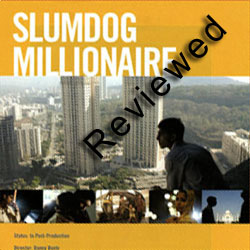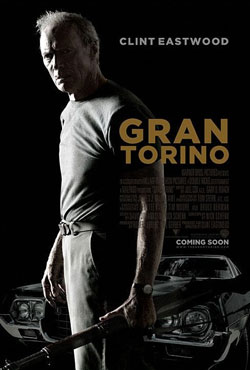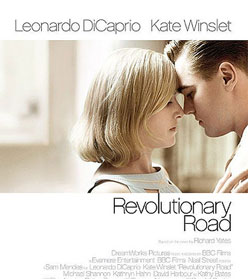Conservative Movies Make Odd Comeback
By Jack Cashill
WorldNetDaily.com - February 19, 2009
With the Oscars hard upon us, let us acknowledge a phenomenon that Hollywood is unable to recognize, let alone celebrate: “conservative” movies have made an unexpected comeback.
 One such movie, the visually exhilarating Slumdog Millionaire, is likely to win best picture. For all its success, however, the movie confuses the critical community.
One such movie, the visually exhilarating Slumdog Millionaire, is likely to win best picture. For all its success, however, the movie confuses the critical community.
Set in the city formerly known as Bombay, Slumdog celebrates traditional virtue in a way that “the original Warner brothers would have embraced.” So sniffs Kenneth Turan of the Los Angeles Times.
“You wouldn't think anyone would have the nerve to attempt [a traditional movie] anymore,” adds Turan.
Like most of Hollywood, Turan seems incapable of framing, let alone answering, the obvious question: why one would need “nerve” to make a good-hearted audience favorite that evokes Hollywood’s golden age?
 The critics are even more perplexed by Clint Eastwood’s box office smash, Gran Torino. Although conceding that the film “isn’t a liberal parable”—duh!--critic Roger Ebert insists on seeing the film as a tale “about Americans of different races growing more open to one another in the new century.”
The critics are even more perplexed by Clint Eastwood’s box office smash, Gran Torino. Although conceding that the film “isn’t a liberal parable”—duh!--critic Roger Ebert insists on seeing the film as a tale “about Americans of different races growing more open to one another in the new century.”
Not exactly. The once viable neighborhood that Eastwood’s character, Korean war vet Walt Kowalski, inhabits has collapsed into an alien hell hole. Ebert would not live there on a bet. The irreverent Kowalski soldiers on only because he has a more formidable arsenal than his neighbors “of different races.”
The reason the neighborhood has turned shabby and violent is obvious: its multiculturalism has become unmoored from binding American values. Come to think of it, maybe it is a liberal parable after all.
At 78, the flag-flying Kowlaski remains the sole enforcer of traditional American justice. What elevates the film over much of Eastwood’s canon, however, is the salutary role Christianity plays in the character’s transformation, not exactly a liberal theme either.
After the gratuitous Catholic-bashing of his awful Million Dollar Baby, Eastwood presents the young priest in the film as a worthy counterpoint to Kowalski, one whose persistence in trying to reach the troubled vet pays off.
Transcending the Darwinian savagery of so many of his early westerns (still a guilty pleasure), Eastwood has his character find redemption not by killing the neighborhood’s young Visigoths or by appeasing them, but by suckering them into a showdown that will cost them face and/or freedom.
 If the Kowalski character makes Hollywood uncomfortable, Meryl Streep’s character in the surprisingly worthy film, Doubt, leaves them apoplectic.
If the Kowalski character makes Hollywood uncomfortable, Meryl Streep’s character in the surprisingly worthy film, Doubt, leaves them apoplectic.
In a fairly standard review, Salon’s Stephanie Zacharek describes Sister Aloysius as a “superbitch from hell,” whose “ambitions, insecurities and small-mindedness” drive her to accuse the seemingly innocent Father Flynn of molesting a child.
One problem. Sister Aloysius is the heroine of the movie. She may pursue Father Flynn with “a certainty that would shock Joe McCarthy”—so says the London Free Press--but despite the “doubt” of the tile, she is right to do so.
Father Flynn is the rare priest that Hollywood could love. The author of the play and director of the movie, John Patrick Shanley, presents him as a conscious agent of “change,” a fresh and ironic breeze from the halls of Vatican II who descends on St. Nicholas grade school in the Bronx of1964.
When Sister Aloysius, a proud traditionalist, protests his inclusion of secular songs in the Christmas pageant, Hollywood instinctively sides with the good Father and snickers at the Sister.
To a person, the critics seemed to have missed the clues Shanley provides about Sister’s Aloysius’s character: her status as widow of a fallen soldier, her solicitous treatment of the older sisters, the good order of St. Nicholas, and unlike Father Flynn, her sincere asceticism.
As happened in the non-fictional church scandals, Flynn uses his progressive airs to cloak his sexual interest in his charges, in this case the troubled young black boy whose cause he has embraced.
Before the scandals became politically useful, hip Catholics and their media supporters greeted whistleblowers from within much the way the critics have greeted Sister Aloysius. It is no wonder that these abuses festered so long.
 Although set back in the same general era as Doubt, and in the same metropolitan area, Sam Mendes’ Revolutionary Road does not allow even allow for the possibility of a supportive faith community like the one that sustains St. Nicholas.
Although set back in the same general era as Doubt, and in the same metropolitan area, Sam Mendes’ Revolutionary Road does not allow even allow for the possibility of a supportive faith community like the one that sustains St. Nicholas.
The sterile 1950’s suburbia that Frank and April Wheeler (Leonardo DiCaprio and Kate Winslet) inhabit with their two luckless children might as well be a century and a continent removed from the Bronx.
Failing to notice the absence of such sustaining traditions as faith and family, critics identify the problem not as the Wheelers themselves but as the time and place in which they live.
Says the San Francisco Chronicle’s Mick LaSalle of 1950’s suburban life. “For the man, it means a life sentence of unrewarding work. For the woman, it's a cell door closing. For both, it's a farewell to dreams.”
This is certainly way the Wheelers see their life, and it is likely the way Mendes sees it. What Mendes fails to grasp is that he has created an unwitting parable not of suburban sterility, but of liberal futility.
Refugees from Bohemian Manhattan, the Wheelers, April especially, define themselves as superior to their neighbors not because of talent or virtue but because of, well, their sense of superiority. They see the “hopelessness” where others don’t.
Like the Wheelers, Hollywood fails to recognize that many families in 1950’s suburbia lived wonderfully rich lives. The external work was as “rewarding” as it is now—why wouldn’t it be?--and the domestic work was likely more so.
The increasingly shrill and self-absorbed April, however, is too righteous for the neighborhood. She plots an improbable escape for the whole family to Paris, where the Wheelers will presumably find fulfillment among equally transcendent spirits.
When April discovers she is pregnant, she insists on aborting the child lest the baby interfere with her Paris plans, a gambit that enrages her more grounded husband.
Almost to a person, critics fail to mention this essential detail. They likely think of the abortion as a good idea, but one that they are disinclined to embrace publicly.
The critics find their spokesperson in the Boo Radley of the movie, a local whack job on leave who assures the Wheelers that everyone sees the emptiness of suburban life, but "it takes real guts to see the hopelessness."
Yes, strip away faith, family, community, patriotism, and ambition from a given life, and one is left with the kind of overweening narcissism that is driving April to madness and that has already claimed her lunatic neighbor. Maybe, liberalism is a disease after all.

Oh, and yes, Frost/Nixon is the most accurate and sympathetic portrait of Richard Nixon ever put on screen.

